Watch the Full Episode Here
Good evening. It's Friday, June 7.
Tonight: There's no doubt that in the United States, certain forms of right-wing speech have been targeted with various forms of censorship over the last decade: in academia, in media and online. But it is equally true that in the United States, one of the primary and most frequent targets of viewpoint-based firings, censorship and other forms of sanction, has been, and still is, critics of the state of Israel. One could spend all night documenting how many Americans have been fired or censored for criticizing this one foreign country, and still not be close to comprehensively documenting all of them.
Since October 7, this long, potent censorship framework has exploded. There are dozens of cases, at least, if not hundreds, of media figures, political officials and academics who have been fired for saying the wrong thing about Israel. As we have repeatedly reported, laws have been enacted in the United States since October 7 to expand the legal definition of antisemitism to include a wide range of commonly expressed oppositional views of Israel. Fanatical pro-Israel governors have issued executive orders purporting to ban antisemitism, though no other form of bigotry in their state, and there have been countless attempts to punish students who sign on to or otherwise express opposition to Israel in a way that is deemed excessive, including efforts by many billionaires and corporations to blackball them from employment.
The long list of Americans being fired for expressing views about Israel deemed over the line, or even bigoted, now has a new member. She is Briahna Joy Gray, my former colleague at The Intercept, who was also the press secretary for the 2020 Bernie Sanders campaign and, until yesterday, the very popular host of the morning news show produced by The Hill entitled Rising. After Briahna became a major target of indignation and even hatred on the part of pro-Israel activists over the last several weeks, The Hill yesterday sent her a summary email, firing her with no explanation and no warning. We will speak to her about what exactly happened and then examine its broader implications.
Then: When Doctor Anthony Fauci appeared before Congress last week, Georgia Congresswoman Marjorie Taylor Greene asked Fauci about gruesome and morally repugnant experiments that had been conducted on dogs, specifically on beagles, a breed chosen specifically because of their particularly trusting and humane loving nature. Democratic partisans and others in the media immediately mocked her for spreading a deranged right-wing conspiracy theory, in part because news outlets for years, particularly The Washington Post, had gone to great lengths to cover for Fauci and depict this connection as a right-wing lie. But it is far from a lie.
Earlier today, the independent journalist Leighton Woodhouse, with whom I have done extensive reporting over the years on the causes of mistreatment of animals, including these exact kinds of dog experiments back in 2017, published a very detailed and amply documented report on our Locals site this morning that laid out all the facts that Fauci, the National Institute of Health, and The Washington Post have united for years to conceal. These facts make the connection between the U.S. government, on the one hand, and dog experiments on the other, of this type manifest.
Roughly at the same time that we published Leighton's article this morning, The Washington Post fact checker, notorious for being extremely partisan in favor of Democrats, published its own fact-check of Congresswoman Green's accusations and Fauci's denial. The Post's fact-checker, Glenn Kessler, began with this confession at the beginning of his article, "When we first saw Greene hold up the photo, we figured this would be easy to debunk — another in a string of misleading attacks against Fauci, who became the public face of the government’s response to the pandemic."
He ultimately concluded that the facts that he was able to find- which are well known and which Leighton cited as well - cast grave doubt on the dialog of both Fauci and the NIH. We will speak to Leyton Woodhouse about what he discovered and reported on our site today.
For now, welcome to a new episode of System Update, starting right now.
One of the topics on which I have long focused is the question of all kinds of censorship, not only the kind that ultimately leads to the state enacting laws to punish people or to restrict their views but also the kinds of informal censorship when institutions that aren't part of the government, academia, business or media, start firing people because of their political views. Expressing unpopular political views is a fundamental part of being in academia, it's certainly a fundamental part of doing journalism and being part of the media. If people start getting fired regularly for expressing certain views, then it means that we live in a society where our discourse is very closed. And although I often focused over the last several years on the problem of right-wing speech being targeted, I have also spent a lot of time, essentially reporting on the fact that, in many cases, the firing of Israel critics is one of the most frequent forms of censorship in the United States. It has been the case for years that one of the easiest ways to get censored or fired in an American newsroom, in an American company, or at an American academic institution, is to criticize Israel in a way that is deemed excessive or deemed to be bigoted in some way. This has been severely worsened since October 7. There have been numerous Americans in the United States fired because of the fact that they criticized Israel.
Just to remind you of a couple of examples – we reported on most of these as they happened:
From NBC News, on October 26, 2023.

The Board of Biomedical and Life Sciences Journal fired him after he posted the following on October 13: “The onion speaks with more moral courage and insight and moral clarity than the leaders of almost every academic institution put together. I wish there was a @The Onion University” while he quoted a post from that satirical website with this headline: “Dying Gazans Criticized for Not Using Last Words to Condemn Hamas.” (NBC News. October 26, 2023)
The same day, the journal released a statement from its board of directors saying Eisen, who was Jewish, had, “been given clear feedback from the board that his approach to leadership, communication and social media has at times been detrimental to the cohesion of the community.”

On October 26, The New York Times reported:
David Velasco was removed after the magazine’s publishers said there was a flawed editorial process behind the publication of a letter that supported Palestinian liberation.
Thousands of artists, academics and cultural workers, including Velasco, signed the Oct. 19 open letter, which supported Palestinian liberation and criticized the silence of cultural institutions about the Israeli bombing of residents in Gaza.
The letter initially omitted mention of Hamas’s surprise Oct. 7 attack, which killed more than 1,400 Israelis, information that was added after criticism from subscribers and advertisers. A preface was also added to say that the letter “reflects the views of the undersigned individual parties and was not composed, directed or initiated by Artforum or its staff.”
The magazine’s publishers, Danielle McConnell and Kate Koza, did not immediately respond to a request for comment. In a post on the magazine’s website Thursday evening, they criticized the decision as “not consistent with Artforum’s editorial process.” The letter “was widely misinterpreted as a statement from the magazine about highly sensitive and complex geopolitical circumstances,” they said in the post, which made no mention of Velasco’s termination. (The New York Times, October 26, 2023).
So, here are two examples after October 7, where people and media were fired simply for expressing their support for the Palestinian cause and or their criticism of the Israeli war in Gaza. It's so notable that you can say anything you want about the American government and its leaders. You can go on and say the American government is radically corrupted, they're fascists, they're warmongers, they're communists. You can say anything you want about Joe Biden or Donald Trump, and you'll be fine. What you can't do is express that kind of criticism about this one foreign country; that often guarantees that you will suffer punishment and that has long been true.
From The Guardian, in June 2007.

Norman Finkelstein, author of The Holocaust Industry, now has less than a year remaining on his contract with the political sciences department of DePaul University in Chicago. He lost his bid for a lifelong post after a four to three vote of the promotions and tenure board.
Mr. Finkelstein, the son of Holocaust survivors, has responded to the decision to, in effect, sack him from his job at DePaul by condemning the vote as an act of political aggression. "I met the standards of tenure DePaul required, but it wasn't enough to overcome the political opposition to my speaking out on the Israel-Palestine conflict." (The Guardian, June 12, 2007)
In 2014, The New York Times reported on a different firing in academia of an Israel critic:

The trustees of the University of Illinois voted on Thursday to block the appointment of Steven Salaita, a Palestinian-American professor who had been offered a tenured position last year, following a campaign by pro-Israel students, faculty members and donors who contended that his Twitter comments on the bombardment of Gaza this summer were anti-Semitic.
“Hate speech is never acceptable for those applying for a tenured position; incitement to violence is never acceptable,” Josh Cooper, a college senior who collected 1,300 signatures on a petition against the appointment, told the trustees before the vote. The student, a former intern for the American Israel Public Affairs Committee, added that “there must be a relationship between free speech and civility.”
Several of the comments that supporters of Israel took exception to referred to parallels Mr. Salaita has drawn in his work between the experiences of Native Americans and Palestinians. (The New York Times, September 12, 2014)
I've been following right-wing discourse for many years on the issue of cancel culture and you can see that it has been the pro-Israel right, often overlapping with the right, but not always, who have been using these safe space arguments, using words like “hate speech” and claiming that people are inciting violence because of their political views. For years, way before conservatives started talking about cancel culture and the like, the targets of censorship were often critics of the state of Israel.
Interestingly, Briahna Joy Gray was not even the first person fired by The Hill for criticizing Israel. In October 2022, Jacobin, the left-wing magazine, reported on the case of Katie Halper, who herself is a Jewish journalist. She had also been working for Rising, the same program Briahna was fired from yesterday.

Are you allowed in the United States to call Israel an apartheid state? We've shown you many times before that in September 2023, a month before the October 7 attack, the former head of the Mossad, appointed to that position by Benjamin Netanyahu, said that Israel had become an apartheid state because they were about to be the minority rulers of a majority of Arabs.
From NBC News was an article on CNN firing Marc Lamont Hill, their long-time commentator, after his speech on Israel drew outrage.

He essentially gave a speech in which he said that we think it's important that Palestinians be free from the river to the sea, and for that, yet another journalist, Marc Lamont Hill, an American journalist, was fired from his job for criticizing Israel in a way that people found offensive.
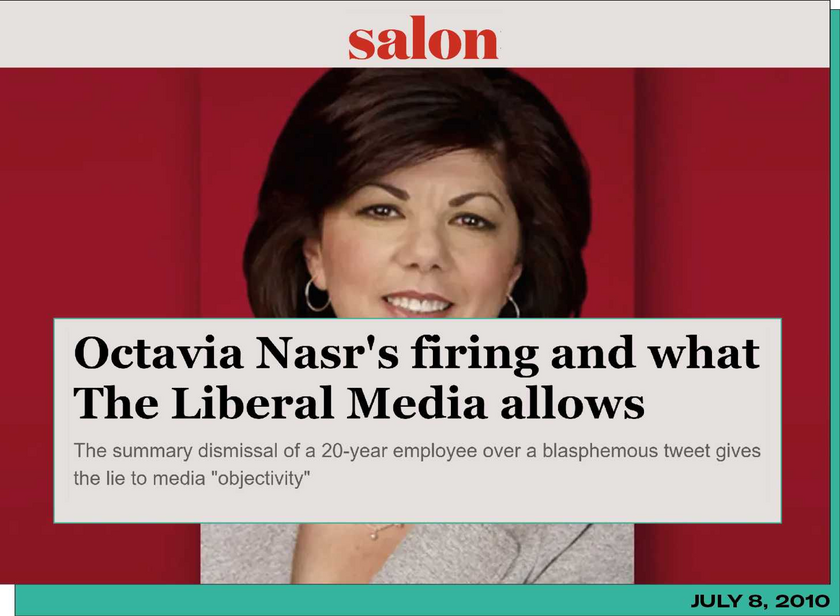
I've been writing about this for so many years. In 2010, a longtime producer for CNN who covered the Mideast region for them, Octavia Nasr, was fired by CNN. It was a summary dismissal by CNN of a 20-year employee who had nothing but positive reviews. And the reason she got fired was because she expressed solidarity or positive sentiments for a mullah in Lebanon who had been linked to Hezbollah. And this is somebody that you're not allowed to praise because he's deemed to be anti-Israel. So she was instantly fired from her job in journalism after 20 years. This is a pattern that goes back many, many years. And Briahna is only the latest example of someone who was fired from her job for criticizing Israel in a way that was deemed excessive.
We are about to talk to Briahna. For those of you who don't know, she is a lawyer and also a longtime journalist. She was my former colleague at The Intercept, where we worked together for about a year and a half. And then she left to become the press secretary of the 2020 Bernie Sanders campaign. After that, over the last several years, she has become the very popular host of the morning news show Rising, which is a show produced by the longtime Washington media outlet called The Hill. And it was yesterday when Briahna received word out of nowhere, with no explanation, that she was being fired at the same time, that she'd become a major source of indignation, contempt and hatred on the part of the pro-Israel faction in the United States. I'm always delighted to speak with Briahna, and tonight is no exception.
The Interview: Briahna Joy Gray

G. Greenwald: Briahna, it's great to see you. Thank you so much for taking the time to talk to us.
Briahna Joy Gray: Thank you for having me, Glenn, and thank you, I have to say, for being just so consistent on this particular issue, especially, when so many others have demonstrated that there is a free speech exception, that is very much Israel shaped.
G. Greenwald: Yeah. I appreciate that. You know, one of the things I've always tried to argue when I've been defending people on the right who are fired or censored or otherwise punished for their views, is that it doesn't matter whether you like that person or whether you like their views. What matters is the principle that you want to affirm. Do you want to live in a society in which people are required to recite certain ideological orthodoxies in order to be heard in the media, to keep their job in journalism? Or do you want to live in a society where there's actually free speech, where people are permitted to involve themselves in debates, even with views that are unpopular and not lose their job over it, especially in journalism, academia, the places where, most of all, we need this kind of free discourse. So, let's talk about your situation. I just went through this long history that I know you know, of all the people in the United States who have been fired over many years, and particularly since October 7, for criticizing the State of Israel in some way or supporting the Palestinian cause. You know those risks to your career and yet you have become, since October 7, one of the most visible and vocal critics of the state of Israel, of its war in Gaza, of the Palestinian cause. Why was that a risk that you were willing to take? And I should say, I think the risk is even higher for people like yourself who aren't Jewish. People who are Jewish can get fired like Norman Finkelstein but have a little bit more protection. But, you were particularly vulnerable, I think, in part for that reason. Why was this cause something that you were willing to risk your job over?
Briahna Joy Gray: Well, for one, I always saw my choice to work at Rising in the first place as driven by my desire to use a large corporate media platform to articulate left politics, which are largely excluded from any kind of mainstream discourse. For me, primarily, frankly, exclusively, it was about my ability to use the platform to advance a kind of politics that I feel passionately about. And the money is just, you know, an ancillary benefit on the side. And especially after Katie was fired from the Hill, my feeling was that it was my obligation, frankly, to test the premise that the CEO, Bob Cusack, had put out there at the time, which is that Katie's firing was not ideological, that they had some other sort of issue with the radar that she had written that was ostensibly the cause of her firing. These radars are our video essays that we deliver directly to the camera. But they had told her that her radar was somehow not up to the standard, that it had been written in a way that was not consistent with The Hill's editorial direction. And that's why she was let go, not because of the content of the radar. So what I said was, I'm going to go full bore on this issue in particular, obviously not knowing at the time that October 7 was going to make it the issue in domestic and international politics, but it was really important to me to not pull any punches, in part because I did not want to validate in any way the Hill's reasoning that they did not already fire a contributor for ideological reasons.
G. Greenwald: Yeah. I mean, I obviously empathize the minute you're a journalist and someone is telling you that you can't say certain things or can't report certain things, that is no longer a job that any person with any dignity should maintain. That's what I said when I quit my own media, The Intercept. And I wish that there were a lot more people who thought that way. All right, let's talk about the firing itself. You were notified of your termination by an email that was sent by the Hill yesterday.
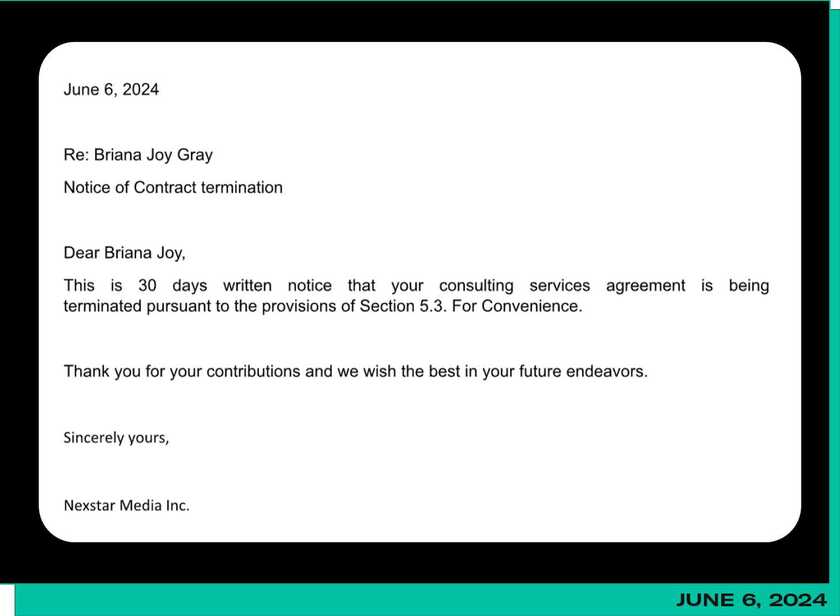
And just to add insult to injury, they didn't even bother to spell your name correctly. And they essentially just said, effective immediately, you are fired. It didn't contain any reasons for it. It's just a very kind of deliberate, summary dismissal. Have you received any word from them either since the firing or before that they had a problem with things that you were saying about Israel?
Briahna Joy Gray: Yes and no. So I have not had any communication with anybody from the Hill about the firing. The producer, Joanne Levine, has not returned any of my phone calls. I immediately reached out after I received this letter, in part because it wasn't clear to me from the texts whether the 30 days referenced in the letter meant that they expected me to finish out the month, or whether or not, Wednesday was my last day in office, and I texted her several times saying, look, I don't need to have a conversation with you, can you just clarify that one point so I can start talking about this publicly? You know what I mean? So no, to date, I've heard from nobody except for Robbie, who has been on vacation and who is frustrated by all of this as well.
G. Greenwald: And to be clear, Robbie, it's Robbie Soave, who's your co-host and with whom you have a lot of disagreements, including in Israel.
Briahna Joy Gray: Yes, very publicly on the show. That's the whole point of the show. But behind the scenes, off camera, he's very supportive of what we're trying to do on the show, of the project of the show itself, and is very protective of it and was very frustrated and disappointed in the actions that The Hill took. But I want to add some more context. I have been under a great deal of pressure for months and months now to tone down my Israel coverage at Rising. It started really in earnest about six months ago or so when there was a radical shift in the staff at The Hill where every single person who worked there was either fired or pushed out. The work environment was so difficult that they chose to leave. And as new staff replaced – and particularly new producers, who exerted much more editorial control over the content than had ever been exerted before – they particularly put a lot of scrutiny on coverage of Israel and started to refer to our coverage as an Israel block. We do about 8 to 12 blocks, or segments, a day. And they started to refer to this idea of an Israel block where we could only do one segment on Israel. And as you can imagine, Glenn, given the plethora of stories that come out on a daily basis, some of them were domestic political issues, some of them are straight news reporting about whatever bombing campaign most recently happened in, let's say, Rafah; some of them are about the choice to have Netanyahu come to speak to Congress; you might have a story about what happened on a college campus protest and on and on. You could easily do 12 segments on Israel every day. And they were segments that were very popular with Rising's audience. I've been on the other side of that, right? But on Israel, it was a double header of a lot of clicks earns money for the company, and is also something that's very newsy and something that ideologically I personally cared a lot about. And yet, unlike other subjects that were very newsy, let's say when we talked about a lot of COVID coverage or talked about some culture issues with trans issues and the like, there was never the same resistance to covering it as much as the audience wanted as there was when it came to Israel.
G. Greenwald: I think there are two important things to note here. Number one is that this is not a foreign war. This is an American war. The United States government is paying for this war. It's arming the Israelis. And I think, most importantly of all, it has completely isolated itself on the world stage. So often, their votes at the U.N. were the only two No votes in the world, the United States and Israel, and the rest of the world either is voting yes, to criticize Israel, to stop Israel, or there's a couple dozen countries in the middle that are abstaining. And so, as an American, of course, this is the war you're going to talk about, not even because it's a war. It's like the war in Ukraine, it's also an American war as well.
The other thing I think is so important in what you said – and I actually wanted to ask you about this – is it would be one thing if you had your own show and you were just there spouting what the company considered, let's call it, anti-Israel propaganda and nobody was rebutting it or checking it. For anyone who has seen this show, you had right next to you there your co-host, Robbie Soave, who I know well. But on this topic, he pretty much has been defending Israel vociferously and you and he have had some very strident arguments, often almost the kind that you wouldn't expect two coworkers to have, because that's how open these disagreements and disputes were. Can you talk a little bit more, though, about the idea? Obviously, The Hill could point to the fact that your commentary on Israel was harming their ratings, their views, or their profit. That would be one thing. Talk a little bit more about what those data shows.
Briahna Joy Gray: Yeah, not at all. In fact, the numbers on The Hill have been down significantly, again, since this whole staff turnover earlier this year, in part because it almost feels, frankly, like they've been trying to sabotage the show for a long time. For example, that edict came down earlier this year that we weren't allowed to respond to clips. And as you know, Glenn, so much of doing an Internet show is responding to viral clips. I mean, that's so much of what the coverage is. But there was this decision to disallow us from doing that. That caused a real steep decline in the kinds of segments we could do. And I've been outright told that certain kinds of guests couldn't come on, for example. I was told that Norm Finkelstein – you brought him up earlier, the foremost scholar on Gaza in the entire country, if not the world – was banned because they said he was a “Holocaust denier.” This is someone whose parents survived the Holocaust, themselves.
So, this is the kind of pressure that we've been under. And as much as you see me, you know, arguing with Robby on air, that is our job. In many ways, that has been more tense behind the scenes because of the editorial control that they have been trying to wrest over me. I think Robby, frankly, he will speak for himself at some point, I'm sure, but he's been under a lot of pressure to push back against me in ways that maybe are even artificial to his own belief structure because the show desire for people at the company desire there to be balance, even if this is not necessarily an issue where there are both sides. And I think that's ultimately what led to the interview, which is being held up as the pretext for my firing. […]
G. Greenwald: Let me interrupt you there because that’s what I wanted to ask you about. Just to give a little context of this, I've definitely been noticing that you have been ascending as a target by pro-Israel fanatics. I mean, they've really been going after you. You did this debate recently where it was very contentious, and the supposed neutral host constantly engaged in attacking you in very vicious ways, calling you a DEI Barbie, and then pathetically, cowardly denying that he was referring in any way to your race.
Briahna Joy Gray: Yeah, exactly. (laughs) I‘ll have T-shirts made.
G. Greenwald: You should change your Twitter name to that. But clearly, the fact that you are out there, that you do have this kind of platform in corporate media where you've been using it to be so vocal in your criticism of Israel has really made you the public enemy number one. But as you say, that really escalated when this very short snippet of an interview that you conducted with, I believe she's a sister of a hostage in Gaza, is that correct? She's the sister of a hostage. At the very end of the interview, so there was no context to it, but they tried to claim that you were essentially mocking and rolling your eyes at a rape victim. We must show this video that caused so much disturbance.
G. Greenwald: Briahna, I honestly never knew that there were so many people on the right who embrace this phrase “believe women,” but ever since October 7, they've been kind of chanting and marching around with their fist in the air, chanting this like they’re Gloria Steinem or something. Before October 7, the idea was, “No, we don't believe women; we want to see evidence and you can question the evidence.” I guess that is yet another view that changed. But what happened there? Were you mocking and rolling your eyes at Israeli rape victims? Explain what it is that you were doing.
Briahna Joy Gray: Of course not. I am hesitant to give The Hill more clicks at this point, but I do encourage people to go and listen to the whole interview because of a couple of things. One is that this is not someone that The Hill reached out to. They weren't looking for a guest who was a family member of a hostage or who gave the perspective of what those family members are going through. This person offered themselves up and very specifically when making the request said that they wanted to talk to me. When our producer Joanne forwarded the request to me, immediately a red flag went up because it seemed to me that this was someone who had a personal vendetta, an agenda against me, and I was cautioning Joanne against having yet another person on that wanted to litigate what they found distasteful about my own personal political views in the context of a show where I, as a host, really don't have the opportunity to go back and forth. I have to moderate a show and be gracious to the person who has come there. But when they sort of opened the door to personal attacks and upset the balance in a way that I don't think is really appropriate for the show. I was in a position where I was under a great deal of pressure once again, to have balance in the coverage that was happening on the show, despite the fact that my Radars were the most – one of the only, well, performing segments that were happening on The Hill at the time because of the decline in viewership, as I was alluding to before. So, throughout this interview, she first said it was, I think, very fine. I think her perspective is valuable and necessary. We were talking about her sister and how hard it is for her to be separated from her. It was, you know, a compelling story. But then she started to interject political claims into the narrative. She made an Islamophobic comment, suggesting that there was going to be terrorism in Dearborn, Michigan because I suppose it's the largest Arab American community. She, talked about the now discredited mass rape hoax on October 7, suggesting that, if the organization that perpetuated many of those claims was credible and that if I only had listened to survivors, I would understand what had happened on October 7, and that her sister could be under similar threats of violence. Certainly, it could be the case that her sister could be under threats of sexual violence but she forced me, frankly, to push back against discredited false claims about events that did not happen on October 7. And as I did that, she seemed to grow increasingly agitated. She would pivot between saying that she didn't want to talk about politics and I said, “Okay, well, tell me about your sister, we'd love to hear about your sister.” And then she would interject politics back into it. When I tried to ask her how she felt as the family of a hostage victim, about how Benjamin Netanyahu has been handling the return of the hostages - he has been protested as you well know, in Israel, for not prioritizing the return of the hostages - she again pivoted away. So, she's not a politician, doesn't know about politics, but then, of course, toward the end, increasingly tried to make it personal about me. I pushed back the little bit that you saw there at the end, and frankly, that eye-roll and exasperation are more about the, sorry, stupidity of my producer choosing to have this guest on, who, very predictably, was going to make it into a personal attack about me than about that woman herself. And I would point out that, today, again, another Israeli guest or I think she was actually an Iranian Zionist guest, have made the same thing when they've come on and then clipped the episodes afterward to launch very personal media attacks against me with a swarm of bots that we now know from reporting over the past week it's coming directly from the Israeli government.
G. Greenwald: You know, it's always been bizarre to me since October 7 that the excuse for destroying all of Gaza, for obliterating it, for blowing it all up and for starving it is they're doing it for the hostages. Because if I were a family member of a hostage in Gaza, and many family members of hostages in Gaza have said this repeatedly, the last thing I'd want is for my own government to be bombing the crap indiscriminately out of the place where my family member was, and to starve them. You had hostages who were released as part of that exchange early on, and many of them came out and said, my biggest fear was Israeli bombs. They talked about how there was often a shortage of food, not because Hamas was starving them, but they even said Hamas was sharing with them and eating the exact portions that they were eating. And so, to even make her representative as if she's speaking for all hostages’ family members is itself a distortion. But I think the important thing I want to delve into a little bit more is the great taboo here – has always been – questioning things that were said in the weeks after October 7 about what happened on October 7. Even though we know for sure it's probably true that so many of the things that were said, particularly the worst things, turned out to be absolute lies. They said that Hamas had beheaded babies. They said that they put them in ovens, that they cut them out of the wombs. As it turns out, it's documented that a grand total of one Israeli baby was killed on October 7. These were all grotesque lies. They had Joe Biden say he saw photos of beheaded babies, even though that never happened. And, then, of course, the big article that purported to step up and say we're about to tell the truth and verify this mass rape claim was a New York Times article that even within The Times, because of so much journalistic sketchiness, the need to retract certain things, people saying they were quoted in certain ways that they didn't believe, it turned into a huge scandal. And The New York Times, when they went to submit Pulitzer nominations, notably excluded that article. So, there are all kinds of questions about the nature of these claims. Can you talk a little bit about some of the uncertainties or some of the things that have been disproven about that kind of claim?
Briahna Joy Gray: Yeah, I'm glad you brought that up because even covering that story on The Hill has been particularly difficult, even within the context of the broader Gaza siege. And one particular instance I remember wanting to cover, I don't remember whose reporting it was, whether it was the Grayzone or some other outlet, but one of the exposés that had basically revealed the inconsistencies in The New York Times reporting, and really blew the lid off of the mass rape hoax as it's come to be known. And when I proposed it as a blog, our producer again, Joanne Levine, said, I don't know about this. Why don't you do it as a Radar? It sounds like a Radar. Basically, she was trying to turn what was a news story into a personal opinion story to put distance between it and the show. And, again, I was not required to do Radar as part of my deal here, I was going to go from three days to four days, about a year ago, and no longer be required to do these radars, which are pretty time-consuming. I started doing Radars again after October 7 with great frequency, because it was really the only way I could get coverage of Gaza-related stories Into the lineup. So that was one instance where particularly there was a clear discomfort around even covering the mass rape hoax story. Of course, when I did cover it, I did turn it into a radar. It was again one of the best-performing blogs that we had. But yeah, I want to give an enormous amount of credit to The Grayzone and the Squirrel Twitter account and all of the people who have been scrutinizing blatantly from The New York Times’s record, the inconsistent claims about what was alleged to have happened on October 7. And I believe today, The London Times finally – one of the more mainstream outlets – that is now going back into the Pramila Patten U.N. report that was held up as corroborating evidence of sexual assault on October 7, when it did exactly the opposite. She said she looked through hundreds and thousands of images and video hours of the cameras that Hamas was wearing and the like and did not see any evidence of rape in any of that imagery. And yet we still have Sheryl Sandberg and the like performatively on camera saying that they're looking at evidence of rape that we know was not actually uncovered by the U.N. and, in fact, in the interview with the sister of the Hamas hostage on The Hill, she says that she also saw this video, saw this video that the U.N. says after examining all of the video and documentary evidence that it did not demonstrate, despite seeing a lot of horrible things, no doubt did not see any evidence of sexual assault on October 7.
G. Greenwald: You know, I think that's the key point. There were obviously terrible atrocities on October 7, as people now say, as always happens and more. I mean, there were clearly civilians who were murdered in horrible and gruesome ways, in ways that were often intentional. But the truth also matters, like to question these maximalist claims doesn't mean you're denying the things that happened on October 7 inside Israel that were very worthy of condemnation. You know, every time we have a certain one of these events, there's always lies told about it. I mean, back when the Bush administration wanted to go to war with Iraq over Kuwait, they made up claims about how Saddam Hussein was pulling babies out of incubators. The Vietnam War started with lies. The other Iraq War started with lies. I remember when the Obama administration killed Osama bin Laden, they immediately released a whole string of lies to emotionally manipulate people to support it, claiming that he was shooting at them, that he had held up his wife as a shield in front of him to show what a coward he was. None of this turned out to be true. So, the idea that we're willing to immediately accept everything that's claimed in one of these events, let alone agree that we can't question it, is amazing to me.
In the little bit of time left with you, let me just ask you: this whole idea that you risk your job if you criticize this foreign country, even though you're an American citizen living in your own country, and that you're free to say anything you want, no matter how vicious or nasty, about American leaders and American government officials but you have to be very careful and walk a very cautious line when criticizing the officials of this one foreign country. How did that feel to you having just lost your job because of it?
Briahna Joy Gray: I mean, look, it's a no-no. I know that I was playing with fire, but to me, there's no point in being at an outlet like The Hill unless you're willing to use it to say things that you're not allowed to say. And I know that I was testing their boundaries. As I've explained, it's been a head-to-head fight almost every single day, for the past six months, to get the coverage you've seen on the screen. But to me, it was worth it. And it's worth it to expose how intolerant outlets like this are. Remember, The Hill really gets a lot of traction out of this idea but it's not really corporate media, it's an online show. It was innovated by Krystal and Saagr., who had this amazing format of left and right and who are outside of the two-party dynamic, neither identifying as Democrats or Republicans, willing to challenge the political establishment, to be very critical of it from both sides, kind of outsider wings. And they cover a lot of issues that are about speech suppression. We covered the Twitter Files extensively. We cover COVID misinformation. We covered all of those things extensively and the show brands itself as being different from other sorts of corporate media. We don't censor. We cover people who are censored. We have Matt Taibbi on, we have you on. And so, I do think that that alone is what kept me around so long, even as I was causing so much trouble internally. They were worried about the brand hit that they were going to take, especially after what happened to Katie Halper. So yeah, I mean, I obviously regret it insofar as I think it's important to have a left perspective on relatively mainstream platforms. That is why I was there. I think it's important, and that is a loss in and of itself. But I also think this is an important teaching moment, an important kind of reckoning moment about how powerful – and this is not a trope or stereotyping – I'm talking about a news story that was reported this past week about an Israeli branch of government that has a social media campaign to influence you U.S. lawmakers. This is what we're talking about here. The incredible influence of not just AIPAC as a lobby, but Israel as an institution in dictating America's media agenda and political agenda. And it should not be missed, by the way, that in both […] happened about a week ago over the debate that I did at the Dissidents Conference in New York, that debate happened a month ago. That clip surfaced and circulated about a week ago by people like Ritchie Torres, who was one of the Congress members that the reporting about the Israeli influence campaign specifically says was involved. And he also was involved in surfacing and disseminating the eye-roll clip, which is purportedly the reason why I've been fired, though, of course, that's not what The Hill has said. I really do think it was a pretext, given my long-standing commitment to covering truthfully what has been going on on the ground in Gaza.
G. Greenwald: It's just one of those bizarre yet very revealing facts of American life that Congressman Ritchie Torres, who represents the single poorest district in the United States, has decided to make a defense of this foreign country on the other side of the world, who have millions of citizens who have a better standard of living than the people in his district, the number one cause. Obviously, he understands the converse of what happened to you, namely, that if you become a fanatical Israel supporter as he has become, it is very good for your political future.
Before I let you go, let me just ask you, you obviously identify as a leftist. You are, at the same time, a harsh critic of the Democratic Party. There's a lot of speculation that Biden's ongoing support for Israel, which we know will last through Election Day and beyond, might endanger his reelection because there are a lot of young people, a lot of people, a lot of left-wing voters whose support he needs in key swing states like Michigan and others… How serious of a threat do you think that is? Do you think the left will snap into line like they usually do and vote for the Democrats? Or do you think that this poses a serious threat to the support that he needs?
Briahna Joy Gray: I do not think they will snap in line. There's obviously a contingent of folks who to date are still saying, yes, I'm very disappointed in him, but we've got to vote blue no matter who. But what has been really remarkable to see for me is that even people who were very critical of Biden, but who also said he's better than the alternative, have now changed their tune, who have changed their mind because, for them, a genocide or what the ICJ has at least described as plausibly a genocide is their red line. And, you know, I'm leaning to my friends, Kristal and Kyle, who I have the utmost respect for. We had a public debate on their podcast, I think last at the end of last summer, about whether or not the left should vote for Biden. I felt very strongly that they should not. This was before October 7, but they felt and they made a reasonable argument along these lines that I respect but disagree with: that because of certain labor gains, the improvement to the NLRB, those being building blocks for a bigger left movement, that it was worthwhile to vote for him. Now, post October 7 and post the eight months now of ethnic cleansing that we've seen in Gaza, they do not feel that way. And I admire that shift, and I very strongly agree with that. I'm so glad that we're all on the same page, but to me, it speaks volumes, that very intelligent people made a reason to argue and said at one point, yes, even knowing all of the critiques more than most folks, and because who criticizes Biden more than people like Kristal and Kyle, very, very few, that they still felt like there was a kind of political argument to voting for him then, but not now. And if they have had that shift being as informed and knowledgeable as they are, I think that's indicative of how over it so, so many other players are. You cannot see the actual headless infants, the record number of amputee children, the blatant disregard for cemeteries – 16 cemeteries being dug up by the IDF. What is the claim there that Hamas is under the dead? Are there tunnels under the cemetery? It's so flagrant that to the extent that anybody thinks that Biden should win because we got a quote-unquote “defeat fascism” or “defeat Trump” or whatever the argument has to be, then it's incumbent on Biden to change his position to earn those votes back, because I think very few kind of moral thinking, feeling, seeing people can look up at the Democratic argument that Biden is better than the alternative and really have a clear picture of that being true, and he's the one that's funding and facilitating the genocide that we've been watching for the last eight months.
G. Greenwald: Yeah, it's very strange to hear people say, “I think Joe Biden is guilty of being complicit in genocide and it's extremely important we do everything possible to keep him in power.” I mean, I don't see how any minimally moral person could possibly join those two statements together. Before I let you go, what is it that you are doing now? Where can people find you and support your work?
Briahna Joy Gray: Well, I have always been living my life like my podcast. Bad Faith is my primary job and I will continue to do that. So, you can get free episodes of Bad Faith every Thursday and you can subscribe at patreon.com/badfaithpodcast to get an additional premium episode on Mondays, you can follow Bad Faith on Bad Faith YouTube. You can follow me at @briebriejoy on Twitter, and I will be posting about new upcoming projects as well. So, please do follow me and stay tuned because I have been wanting, frankly, to have more space in my schedule to get back to some writing projects, and I anticipate starting those soon.
G. Greenwald: Briahna, it's always great to see you. I have the utmost admiration and respect for what you do. I'm actually kind of glad in a way that your firing is so obvious that it was because of your views about Israel because it really manifests the actual culture in the United States when it comes to free speech and free discourse. And I appreciate your coming on. We'll talk soon.
Briahna Joy Gray: Thank you so much, Glenn, I appreciate it.
The Interview #2: Leighton Woodhouse
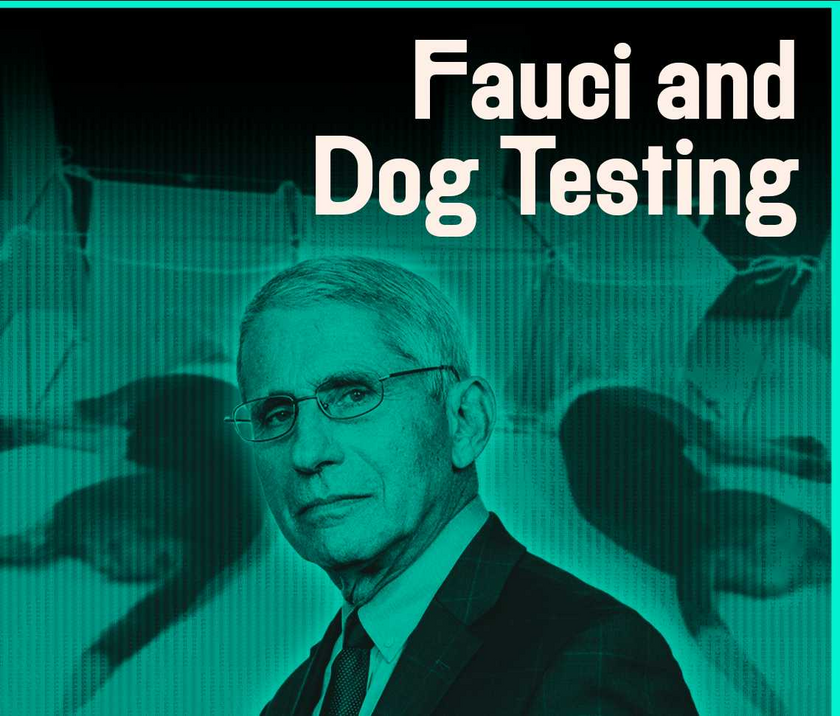
Leighton Woodhouse is a longtime freelance journalist and documentary filmmaker based at the moment in Oakland, California. He has done extensive reporting at many publications, including documentary video reporting at The Intercept, both by himself and many times with me as well. It is impossible to place Leighton ideologically, which is what makes his reporting highly reliable. He currently does much of it on his Substack page at leightonwoodhouse.substack.com/.
Earlier today on our Locals platform, we published a new original reporting from him about an ongoing controversy.
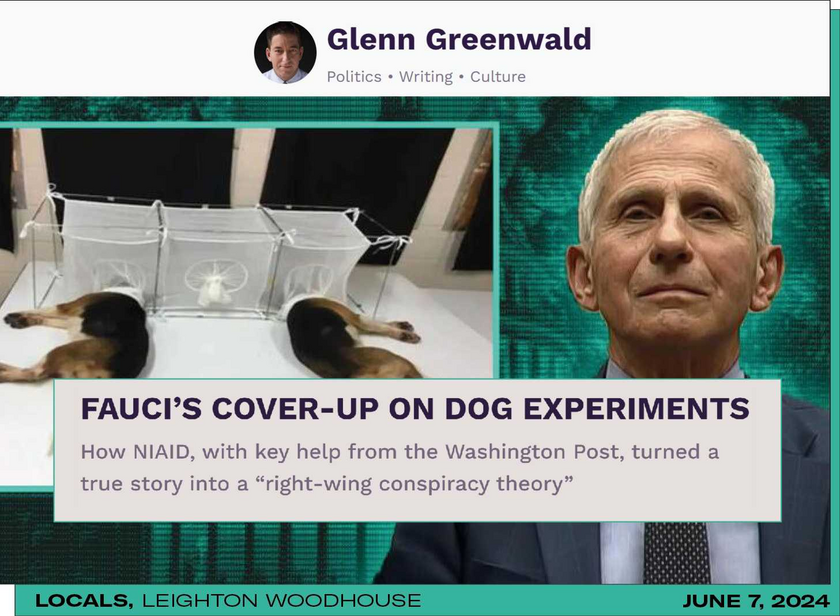
I really think that Leighton is one of the great independent journalists in our country, and I am glad that he published with us, and it is great to welcome his debut appearance on System Update.
G. Greenwald: So, let's start with the controversy that you published your article about, which was initiated when Rep. Marjorie Taylor Greene held up a picture of a hideous dog experiment that involved extreme suffering and torture of dogs for utterly unnecessary reasons and suggested that somehow Dr. Fauci was connected to those experiments, and he kind of expressed anger and indignation about this suggestion. We have this video of her asking this question. Let's go ahead and quickly show that.
(Video. Marjorie Taylor Greene. June 3, 2024)
Marjorie Taylor Greene: Thank you, Mr. Chairman. Mr. Fauci, you were quoted on CBS Face the Nation saying it's easy to criticize, but they're really criticizing science because I represent science. Do you represent science, Mr. Fauci?
Dr. Anthony Fauci: I am a scientist who uses the scientific method to gain information.
Marjorie Taylor Greene: Yes. You said you represent science. Do you represent science, Mr. Fauci? Well, yes or no?
Dr. Anthony Fauci: No, that's not a yes or no.
Marjorie Taylor Greene: Yes. It's a yes or no.
Dr. Anthony Fauci: I don't think it is.
Marjorie Taylor Greene: Okay. Well, we'll take that as a you don't know what you represent. But, as director of the NIH, you did sign off on these so-called scientific experiments. And as a dog lover, I want to tell you, this is disgusting and evil. What you signed off on and these experiments that happened to beagles paid for by the American taxpayer. And I want you to know, Americans don't pay their taxes for animals to be tortured like this. So, the type of science that you are representing, Mr. Fauci, is abhorrent, and it needs to stop.
G. Greenwald: All right. So that was Congresswoman Marjorie Taylor Greene. Now, you and I wrote an article in 2017 together, and I believe we produced a video showing how hideous some of these experiments are. They particularly choose beagles because of their extra-trusting nature. We talked about how some of these experiments involved breeding dogs into the world solely to experiment on them, and then kill them afterward, so they have a life of nothing but torture and experimentation. That article was mostly about experiments in the corporate world and in the academic world. Before we get to the specifics of Dr. Fauci and his connection to these programs, talk a little bit about what these experiments entail, including the ones that Congresswoman Greene was referencing.
Leighton Woodhouse: Yeah. So, this is an incredibly dreary topic that you and I have covered before. There are about 60,000 beagles that are tested in a year. By the way, I should say that we're talking about beagles right now, but millions of animals are tested on a year, most of them mice, which don't even get reported to the government. So, we actually have no idea how many animals are tortured in these labs in a year. But these beagles are often kept as you mentioned before, they are a docile, non-aggressive, eager-to-please breed of dog, which makes them perfect for laboratory technicians to be able to draw blood samples, inject them, do whatever they want to with them in experiments, which can include things like force feeding them laundry detergent, injecting them with bacteria with deadly viruses, etc. Sometimes the experiment was actually with dogs from shelters, but usually, they're raised in these factory farms for laboratory dogs, in which they're held in stacked cages, with wire floors. They're just sitting in their own poop and pee all day. I think the legal regulations are that the cage needs to be just a few inches bigger than their body, and if they make it twice that size, then they never have to take them out to exercise. So, often they are twice that size and the only exercise that these dogs have is spinning in circles in their cages, never touching the earth, never seeing daylight. And then they're shipped out to some laboratory to perform heinous experiments on them.
G. Greenwald: So, the experiment in particular that was referenced in that exchange, and the one that has become the topic of controversy, talk about what that experimentation entails.
Leighton Woodhouse: So, in 2019, in Tunisia, there was an experiment that was performed on a number of beagles in which they had their heads placed into mesh bags that were filled with starved sand flies, which carried a parasite, which in turn carried a disease with which the researchers were trying to infect the beagles. So, this experiment took place. There are pictures of it. A paper was published in PLOS Neglected Tropical Diseases that was the academic journal it was published. In that article, the researchers acknowledged funding from NIAID. NIAID is the institute within NIH, which is led by Anthony Fauci. So, they acknowledged the funding from NIAID. This is in 2019. Fast forward a couple of years to 2021. This is an old experiment by now, but the White Coat Waste Project, which is a group that advocates against taxpayer funding of heinous experiments like this on animals, discovered the paper, publicized it, wrote a blog post about it, and, then, a couple of months after that, there was a letter circulated by a bipartisan group of Congress members expressing their disapproval of taxpayer money being used for this kind of heinous research. So, these two things together sort of spark a backlash online. There was a #ArrestFauci trending on Twitter. According to NIAID, they were inundated with so many phone calls that for two weeks, Fauci's assistant just stopped answering the phone. This is a real publicity crisis for them. We know that this is a political crisis for them because White Coat Waste was able to get ahold of their emails through a FOIA request. And in those emails, we have Anthony Fauci, telling his colleagues we are being bombarded by protesters and asking them to look into this experiment.
G. Greenwald: I want to emphasize and draw out one part of what you said. So, the entire reason that this became a controversy is that there was an official and final publication that was published that the White Coat Waste project discovered, where it explicitly said that this specific dog experiment, the one where they put their heads in mesh bags and they're infected on purpose with this pathogen through all these sort of – what are they called? The things that are […]
Leighton Woodhouse: Sand flies.
G. Greenwald: Sand flies. It said specifically, though, that it was funded, at least in part or in whole, by the agency that Dr. Fauci ran. So that seemed like pretty definitive proof. What happened then after that that made this a controversy at all?
Leighton Woodhouse: So, it surfaced and it became a problem for NIAID. And what happened after that was basically, an orchestrated cover-up. So Fauci sends out this email saying, “We got to do something about this because we're being bombarded by protests.” What we know from these email threads is that within two hours, NIAID receives an email from Abhay Satoskar, who's the principal investigator on the Tunisian project. He's a microbiologist at Ohio State University. He sends NIAID an email. Following up on a phone call, he says this is following up on a phone call. So presumably NIAID had called him shortly before he sent the email. And in the email, he said this was all a big mistake. NIAID didn't actually fund our experiment. This was just like a paperwork error or something. I should be clear that we have a copy of the application to NIAID that was approved and which specifically details precisely the experiments that were carried out in Tunisia. Nevertheless, he says there was a mistake. And then within ten minutes of sending that email, he emails the editor of PLOS Neglected Tropical Diseases, asking for a correction. The editor of PLOS Neglected Tropical Disease, as a close colleague of his. She is an expert on the exact same subject as he is, which is this disease called leishmaniasis. In fact, she's an expert on infecting beagles with leishmaniasis via sand flies. Her own research has been publicized by the White Coat Waste Project. She is co-published with Abhay Satoskar, with the principal investigator on the Tunisian project. And to add to all that, she works for NIAID, so her boss is ultimately Anthony Fauci. This is just rife with conflicts of interest. She acknowledges one of them with her colleagues. She says “I could have a possible conflict of interest since I work for NIAID,” regardless of this, these conflicts of interest, the question goes forward. It's published in the journal, and then NIAID has what it needs to be able to go to credulous reporters and say, this was just an accident, and this whole thing is just a big right-wing conspiracy theory. So, among those reporters, the foremost among them is Dana Milbank, columnist for The Washington Post, who takes their excuse, their alibi, and writes this column just dripping with sarcasm, making fun of the idea that Anthony Fauci is going to kill your puppy and calling it all a right-wing conspiracy. So, he publishes that column and then after that, and this is just what I found really interesting because you just see the way that the media ecosystem lines up, just one after the other of these fact-checkers like PolitiFact, Snopes, etc. just start regurgitating the same line. Shortly after that, The Washington Post released a big investigative story, in which they sort of unearth the right-wing conspiracy that had created this crisis at NIAID, where at a time when NIAID was busy trying to vaccinate children and they were distracted by all these angry phone calls and kind of goes through the anatomy of this online right-wing conspiracy.
So, that's basically the end of the story, but they published the story, and, then, for years after that, like between then and now, it's been sort of consigned to the dustbin of right-wing conspiracy theories. Ironically, Marjorie Taylor Greene brought it up this week at this hearing, which inspired Glenn Kessler from, again, The Washington Post. Their fact-checker to his credit, wrote a very good, thorough, essentially debunking of the idea that this is a right-wing conspiracy theory that he didn't acknowledge in the piece that his own paper was the one that had propagated this myth. But he did very responsibly go through the facts and say, it looks like this was bungled by NIH and that their sources were shaky, etc., etc. And so that's what we're seeing now.
G. Greenwald: Yeah, it's amazing because when we got your article that you wrote completely separately, we decided we were going to publish it, first thing on Monday morning and, then, basically at the same time, The Washington Post fact-checker publishes a story that goes over many of the same facts that you did.
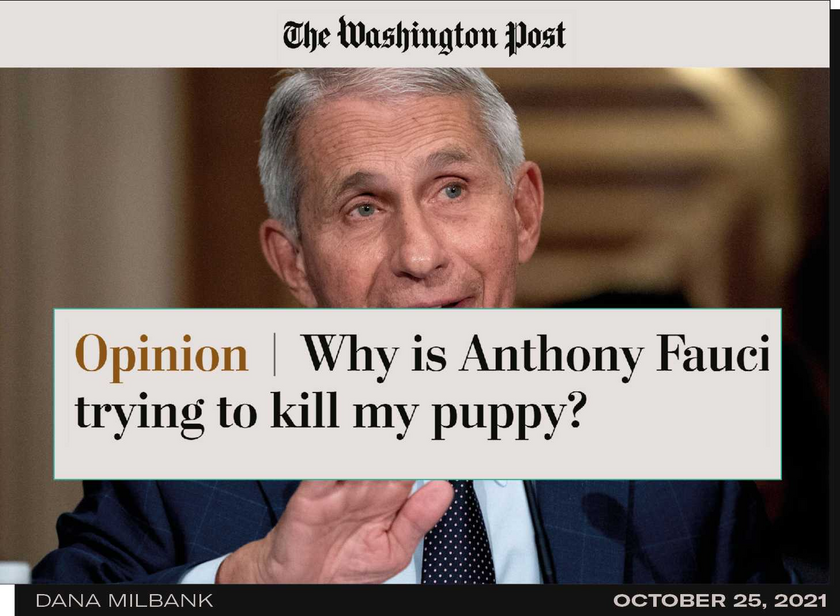
There you see it, from 2021. And, you know, the whole thing, as you say, is completely sarcastic, like, Anthony Fauci is trying to kill my dog, you know, and mocks the entire thing.
I think one of the most important things that happened here is that, as you said, there was this article that was out for a long time saying that it was funded by the agency Dr. Fauci runs and then when this kind of minion of Dr. Fauci, someone who really does work ultimately for him, calls this journal and asks for a correction, they immediately corrected it, even though the editor herself essentially works for Dr. Fauci. And this was the correction that then they sent, as you said, to every gullible news media outlet that immediately published this claim that, oh, the whole thing was false all along.
Was there ever any investigation of this denial before either this magazine published it or anybody else then took that denial or that correction and then used it to suggest that this was false?
Leighton Woodhouse: Certainly, not from Dana Milbank, because we have his email to the principal investigator basically just saying, look, I want you to confirm that what I heard from NIAID, which is that this is all a big mistake. I believe that's probably the sum total of the investigation.
G. Greenwald: Was there any investigation by the Journal that issued the corrections? Do you have this person who works with Fauci calling and saying, you need to issue this correction? And then, they issued this correction by the editor, who also worked for Fauci. Was there any attempt by that magazine to verify whether what they had published originally, which is that this was in fact funded by the U.S. government, was true or not, or did they just publish this correction based on the single phone call?
Leighton Woodhouse: No, there's no evidence that there was any investigation. From what we've seen, the request was made. The request was granted. It was basically just rubber-stamped.
G. Greenwald: Okay. So, now, internally, this is one of the things that your article today extensively covers and I think is so important. It shows, based on these emails that were obtained through FOIA with Dr. Fauci and those who worked with him. To me, it's almost very similar to what happened with the Lancet letter where, behind the scenes, Fauci was hearing one thing, and, then, they were desperate to try to organize a letter that said, oh, no, we know for sure that it's naturally occurring, even though, of course, they had no idea that that was true, that all kinds of indications from top epidemiologists that it may have been more likely that it came from a lab, and then they engineered this PR campaign to manipulate the public, and that the media then mindlessly carried forward Dr. Fauci's methods that any attempt to question the origins of the COVID pandemic and the virus in any way, by suggesting it wasn't naturally occurring, was a right-wing conspiracy, a right-wing lie, some kind of, you know, people were banned from the Internet for suggesting it. The emails that you reported on show a great deal about how, internally, Dr. Fauci and those who work with him can manipulate the media and orchestrate these kinds of PR campaigns to make the media say things that they don't have any idea whether or not they're in fact true. So, what is it that's reflected in these emails internally with Fauci about The Washington Post's Dana Milbank, or just in general about what the media was doing?
Leighton Woodhouse: I mean, it's almost too strong to call it manipulation because the reporters are so eager and enthusiastic to go along with it. So, like in the emails from The Washington Post reporter Beth Rinehart to the principal investigator of the Tunisia Project, she says right at the beginning of the email, “We're reporting on this massive disinformation campaign against Anthony Fauci.” So, she had already reached her verdict. To your point about the COVID-19 origins stuff, I've reported on that as well with Michael Shellenberger and Alex Gutentag. It is very uncanny the way in which there’s similarity here, because, you know, the “Proximal Origins” paper that was written by those scientists to disprove the lab leak hypothesis was essentially seeded by Fauci and NIH. So, in the sort of the backchannel they're asking for this paper to be written, the paper is written, on message with what they want it to be and then what is published. Then Fauci can pick it up and wave in front of the cameras and say, this “Proximal Origin” paper shows that it definitely came from animal spillover. So, it's exactly the same play. It's such a crude strategy that I… it's hard to even call it like a psyop because it's just so... yeah, easy to debunk. And it was very easy for me to debunk at the time. But to me, the most shocking thing about, or maybe not the most shocking but the most illuminating thing about it is the degree to which these reporters were just tripping over themselves to get this excuse from NIAID, to use it to exonerate them from the accusation.
G. Greenwald: To me, one of the biggest takeaways, if not the biggest, is, you know, you have these emails that you report and I really hope people read your article. It's not very long, but it's very concise. It goes over these key emails. You know, they were basically celebrating, saying things like, “Oh, Dana Milbank is a great help. Like, kind of like he's their little tool. And the whole idea of journalism is that you're supposed to report adversarially on those in power. That's the whole idea of it. If you're just carrying messages of the government, no one needs you. You're just a propagandist, you should go work for the government. They have their own spokespeople. Nobody needs the media to replicate that message. But in the era of Trump, it just is so true. And we see it so clearly in the story that whoever is perceived as antagonistic to Trump automatically becomes a hero among American liberals who the media then seeks to serve. We've seen it over and over with Robert Mueller and now with Jack Smith and with Michael Avenatti, and on and on and on and on.
Talk a little bit about how they were talking about the media. What kind of view do they have of the media inside the vouches operation?
Leighton Woodhouse: So, Dana Milbank actually went back to them. Again, this is how enthusiastic these reporters are about doing the bidding of their favorite political leaders. He went back to them and said, I'm thinking about doing a follow-up story about the imperviousness to the facts of this conspiracy theory, something to that effect, and asked, do you have any more? There was something that kind of came through in these emails, which is that the reporters keep asking for more evidence that this money wasn't used on this experiment. And it's almost like they are not really buying the line, or they don't think that their readers will, and they're looking for something stronger to be able to hang their hat on, which is not forthcoming from NIH. But he goes back again to the trough and says, do you have any more evidence? I'm going to write another story. And to the response to that from the NIH staffer or the NIH staffers, can we get a response for Dana? He's being very helpful here. So, it's like the collusion between them. It's almost organic. It's like there isn't a need for a backroom conspiracy. The relationship is already established and the media is coming together in order to deflect from these accusations that are out there and turn it into a right-wing conspiracy theory. That's the role not yet understood. The reporters understand it. It's just automatic.
G. Greenwald: Yeah, it's a political operation, pure and simple, which is fine for government officials, although not necessarily for health policy officials. But it's definitely not fine for journalists, so-called. All right. Last question, Nathan. On the question of dog experimentation, I think a lot of people obviously a ton of Americans have dogs. There's a lot of empathy for dogs. We saw that in the response to Kristi Noem's biography, where she bizarrely boasted of having pumped bullets into her puppy's skull, and it didn't go over well with almost anybody. Nonetheless, when I think about some people who think about animal experimentation, their view is, yes, there's a lot of suffering, even torture, that takes place as part of these experiments. But they're necessary to develop vaccines or cures for diseases for humans. And at the end of the day, humans are supreme, say many people and it's not nice that we have to use dogs and other animals to do this research, but it's worth it if it's saving human lives. Are these experiments necessary to save human lives?
Leighton Woodhouse: No. One thing that is important to understand is that NIH funds basic science research. So that means that it's stuff that there's not an immediate goal to like, ‘if we discover this, then we can find this vaccine.’ I mean, some of the projects are towards the end of eventually learning more about this disease so that we can develop a vaccine. But it's not like if you had a test where if we go through this trial we'll be able to develop this cure. That stuff is paid for by pharmaceutical corporations. That's the applicable side. So, you don't need the government to fund that stuff. The government is there to fund basic research but there is no immediate commercial applicability. So, these things are like tests of, you know, how long does a dog have to run on a treadmill with a collapsed artery before it expires and dies? They're just curious to find that out. And so, NIH will fund it. And then what I've learned from reporting on this at length is that this becomes sort of a treadmill because what happens is the scientists who are engaged in basic research know that they can get funding from NIH for a particular experiment. So, next year they need to keep their lab open. They need to keep their research assistants paid. They have responsible fiscal responsibilities. If they just tweak the experiments a little bit, you know, use a different breed of dog or slightly different arteries severed or something like that, just to tweak the experiment, then they can get the funding all over again. So, it becomes this never-ending cycle, because it's not justified by any actual need in the world. It's just justified by the needs of the institutions that are conducting these experiments.
G. Greenwald: All right. Great job on this reporting. People can find the reporting on our Locals page. It's available for everybody. They can find your leightonwoodhouse.substack.com/p/work-from-home. I have worked many times on the causes of the mistreatment of animals, what's happening in factory farms, and what's happening in experiments. And I don't think there are many people out there any more knowledgeable than he is on this issue, and many others as well. So, Leighton, thanks so much for that article. It was great. It was great talking to you as well. I hope to see you soon.
Leighton Woodhouse: Thank you. Thank you so much.
All right. All right. All right.
So that concludes our show for this evening.

























